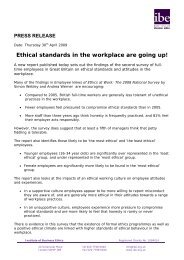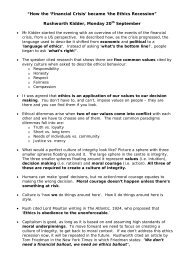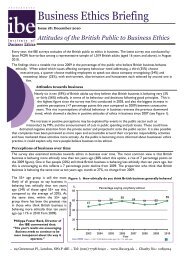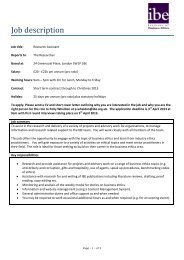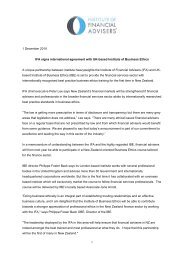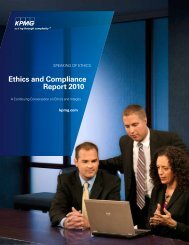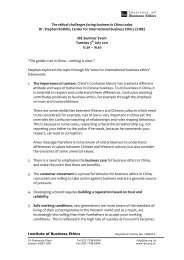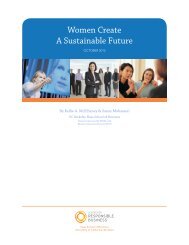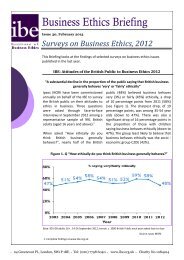here - Institute of Business Ethics
here - Institute of Business Ethics
here - Institute of Business Ethics
Create successful ePaper yourself
Turn your PDF publications into a flip-book with our unique Google optimized e-Paper software.
Sir Cyril Chantler<br />
Chairman, University College London<br />
Partners Academic Health Sciences<br />
System<br />
“<br />
In his book Humanity: A Moral History <strong>of</strong> the Twentieth<br />
Century, published in 1999, Jonathan Glover wrote:<br />
“In Europe at the start <strong>of</strong> the twentieth century most<br />
people accepted the authority <strong>of</strong> morality... At the end <strong>of</strong><br />
the century, it is hard to be confident either about the moral<br />
law or about moral progress”.<br />
In our post-modern world, organisational values<br />
seem to be too rarely developed or applied. The<br />
common law is an inadequate substitute for an<br />
ethical framework which should be part <strong>of</strong> corporate<br />
governance; we need conscience as well as contract.<br />
Indeed Adam Smith pointed out in A Theory <strong>of</strong> Moral<br />
Sentiments, which is the companion book to The<br />
Wealth <strong>of</strong> Nations, that conscience or a sense <strong>of</strong> duty<br />
was an important part <strong>of</strong> regulation. So w<strong>here</strong> are<br />
we today? I would suggest that at least in the UK<br />
we have made little progress over the last decade.<br />
Politicians’ expenses, police entertaining, press<br />
hacking and bankers greed provide a bleak picture.<br />
Someone has just coined the term ‘trickle down<br />
morality’.<br />
But times change, pendulums swing and we can<br />
learn. None <strong>of</strong> us are perfect and we all, including<br />
myself, could do better. We now need to try again to<br />
ensure that all organisations take ethics seriously and<br />
work on their values. The bigger the organisation,<br />
both public and private, the more important this<br />
is. This is why the <strong>Institute</strong> <strong>of</strong> <strong>Business</strong> <strong>Ethics</strong><br />
deserves our wholehearted support. It is a matter <strong>of</strong><br />
enlightened self-interest!<br />
“<br />
“One <strong>of</strong> the major social evolutions <strong>of</strong> recent<br />
years has been the emergence <strong>of</strong> non-commercial<br />
concerns, such as the safety <strong>of</strong> personnel or the<br />
protection <strong>of</strong> the environment, at the forefront <strong>of</strong><br />
companies’ operational strategies. Other ethical<br />
issues, such as the prevention <strong>of</strong> fraud and corruption<br />
have recently made similar progress.<br />
More difficult to measure is the link between<br />
business and human rights which has recently<br />
become more visible. The important work carried<br />
out by the UN special rapporteur on this question,<br />
validated by the Human Rights Council in 2011,<br />
clearly contributed towards clarifying the situation<br />
by forcing the UN member states and companies to<br />
meet their respective responsibilities.<br />
Bernard Claude<br />
Chairman, <strong>Ethics</strong> Committee, Total<br />
In order for these main ethical principles to be<br />
implemented on the ground, we need to move past<br />
the ‘name and shame’ approach, and to count on the<br />
active collaboration <strong>of</strong> all the involved parties. The<br />
concepts <strong>of</strong> integrity and human rights should also<br />
be considered as ethical values, and not just as risks<br />
to manage.<br />
“<br />
I B E C E L E B R A T I N G 2 5 Y E A R S<br />
I B E C E L E B R A T I N G 2 5 Y E A R S<br />
8 9



